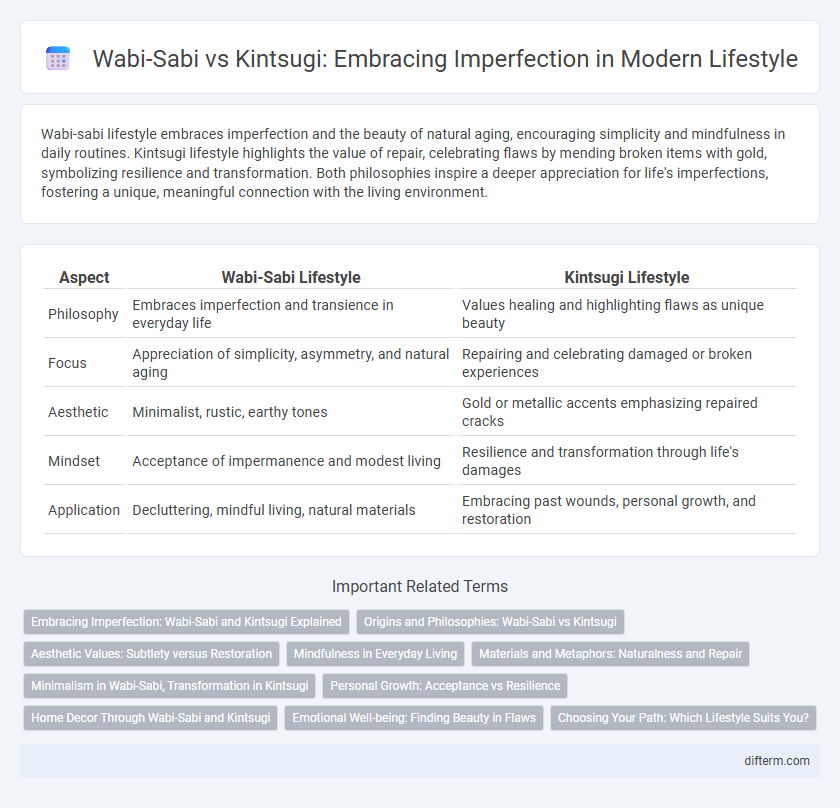Wabi-sabi lifestyle embraces imperfection and the beauty of natural aging, encouraging simplicity and mindfulness in daily routines. Kintsugi lifestyle highlights the value of repair, celebrating flaws by mending broken items with gold, symbolizing resilience and transformation. Both philosophies inspire a deeper appreciation for life's imperfections, fostering a unique, meaningful connection with the living environment.
Table of Comparison
| Aspect | Wabi-Sabi Lifestyle | Kintsugi Lifestyle |
|---|---|---|
| Philosophy | Embraces imperfection and transience in everyday life | Values healing and highlighting flaws as unique beauty |
| Focus | Appreciation of simplicity, asymmetry, and natural aging | Repairing and celebrating damaged or broken experiences |
| Aesthetic | Minimalist, rustic, earthy tones | Gold or metallic accents emphasizing repaired cracks |
| Mindset | Acceptance of impermanence and modest living | Resilience and transformation through life's damages |
| Application | Decluttering, mindful living, natural materials | Embracing past wounds, personal growth, and restoration |
Embracing Imperfection: Wabi-Sabi and Kintsugi Explained
Wabi-sabi lifestyle values simplicity, natural imperfections, and the beauty of aging, encouraging mindfulness and acceptance of life's transient moments. Kintsugi, the art of repairing broken pottery with gold, symbolizes resilience by highlighting flaws rather than hiding them, turning damage into unique beauty. Both philosophies promote embracing imperfection as a path to authenticity and deeper appreciation of life's evolving nature.
Origins and Philosophies: Wabi-Sabi vs Kintsugi
Wabi-Sabi, rooted in Japanese Zen Buddhism, emphasizes the beauty of imperfection, impermanence, and simplicity, celebrating natural aging and transience in everyday life. Kintsugi, originating from 15th-century Japan, embodies the philosophy of repair and resilience by mending broken pottery with gold, highlighting flaws as valuable parts of an object's history. Both lifestyles cultivate mindfulness and acceptance, with Wabi-Sabi focusing on humble elegance and Kintsugi on embracing damage as a source of strength and beauty.
Aesthetic Values: Subtlety versus Restoration
Wabi-sabi embraces aesthetic values centered on subtlety, imperfection, and the natural aging process, highlighting beauty in simplicity and transience. Kintsugi, by contrast, focuses on restoration through the visible mending of broken objects with gold or lacquer, celebrating flaws as part of an object's history and renewed value. Both philosophies emphasize appreciation of imperfection but diverge in expressing beauty through quiet acceptance versus dignified repair.
Mindfulness in Everyday Living
Wabi-sabi lifestyle embraces mindfulness by appreciating imperfection and impermanence in daily moments, fostering a calm awareness of simplicity and natural beauty. Kintsugi lifestyle encourages mindful reflection through the celebration of flaws and repairs, symbolizing resilience and the value of growth in life's journey. Both practices cultivate present-moment awareness and acceptance, enhancing emotional balance and intentional living.
Materials and Metaphors: Naturalness and Repair
Wabi-sabi lifestyle embraces imperfection through natural, weathered materials like raw wood and unglazed pottery, symbolizing simplicity and transience. Kintsugi lifestyle highlights the beauty of repair by mending broken ceramics with gold lacquer, turning flaws into valuable metaphors for resilience and renewal. Both philosophies celebrate authenticity and the passage of time, fostering mindfulness through tactile, meaningful materials.
Minimalism in Wabi-Sabi, Transformation in Kintsugi
Wabi-sabi lifestyle embraces minimalism by valuing simplicity, natural imperfections, and the beauty of modest, unadorned living spaces that promote tranquility and mindfulness. Kintsugi lifestyle highlights transformation by celebrating repaired objects with golden seams, symbolizing resilience and the unique history that enhances an item's value rather than diminishing it. Both philosophies encourage appreciating imperfection, with Wabi-sabi fostering a minimalist aesthetic and Kintsugi emphasizing the beauty of restoration and personal growth.
Personal Growth: Acceptance vs Resilience
Wabi-sabi lifestyle embraces personal growth through acceptance of imperfection and the beauty found in natural aging and flaws. Kintsugi lifestyle fosters resilience by highlighting the strength gained from repairing and embracing brokenness with golden joins. Both philosophies cultivate self-awareness and emotional growth by encouraging individuals to find value in life's vulnerabilities.
Home Decor Through Wabi-Sabi and Kintsugi
Home decor inspired by wabi-sabi embraces imperfection, simplicity, and natural materials, creating a serene and authentic living space that highlights the beauty of aging and wear. Kintsugi complements this philosophy by celebrating repaired objects with golden seams, symbolizing resilience and transformation within the home environment. Together, these Japanese aesthetics foster a mindful lifestyle that appreciates impermanence and the unique stories embedded in everyday decor.
Emotional Well-being: Finding Beauty in Flaws
Wabi-sabi embraces the beauty in imperfection and transience, encouraging emotional well-being by accepting life's natural ebb and flow. Kintsugi, the art of repairing broken pottery with gold, symbolizes healing and resilience, fostering a mindset that finds strength and value in flaws and scars. Both philosophies nurture self-acceptance and mindfulness, promoting inner peace by valuing authenticity over perfection.
Choosing Your Path: Which Lifestyle Suits You?
Wabi-sabi embraces simplicity, imperfection, and natural aging, cultivating contentment through minimalism and acceptance of transience. Kintsugi highlights the beauty in repair and resilience, celebrating flaws by mending broken objects with gold to create unique, valuable art. Choosing between these lifestyles depends on whether you resonate more with serene acceptance or transformative healing as a philosophy for daily living.
wabi-sabi vs kintsugi lifestyle Infographic

 difterm.com
difterm.com